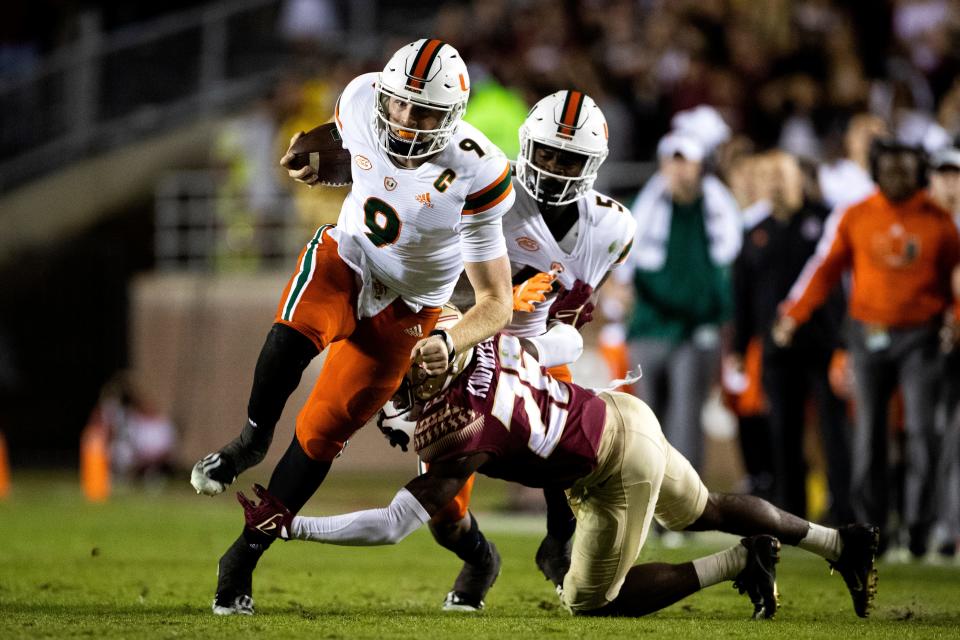Miami and Florida State, two of the most storied programs in the deep South, are about to become irrelevant in college football.
Not much different then Florida’s letter schools; UCF, USF, FAU, etc. And it will likely happen quickly. Once Oklahoma and Texas join the SEC in 2025 and USC and UCLA enter the Big Ten in 2024, college football, which has been self destructing for many years now, will officially break apart, implode on itself.
To be relevant, you will need to be a member of either the SEC or the Big Ten, because they will be the only conferences that matter. And despite much speculation that the SEC will add teams like Florida State, Miami, Clemson and others, that is unlikely to happen, anymore then the Big Ten is likely to add Oregon, Washington or some other schools.
More on changing college football: FSU’s future is clouded by bad moves in the past | David Whitley
A new day: College football as we knew it soon will be gone
Looking at FSU: College football conference realignment: What are the best, worst and most likely scenarios for FSU?
Only Notre Dame, the iconic home of the golden dome and Touchdown Jesus and a plethora of legendary players and coaches, has the bona fides, the credentials needed to impress the two remaining power conferences. And if Notre Dame goes anywhere, it will be to the Big Ten.
That might lead to the Big Ten adding someone else, possibly Stanford or North Carolina, both schools highly regarded for their academic excellence, very important in the Big Ten, and both with solid athletic programs and the ability to deliver television viewers in new markets.


Because that’s what it’s about now. From a competitive standpoint, adding FSU, Miami and Clemson makes perfect sense for the SEC, just as adding Oregon and Washington fits for an expanded Big Ten. But this is no longer about competition, about state rivalries, about conferences with comfortable geographic fits that added color and pride to the college football scene.
College football is all about the money — TV money
This is now about one thing: money. And if the SEC or the Big Ten are going to add anybody, they have to bring more to the table then they take away. And the simple fact is that Florida State and Miami, and probably even Clemson, have nothing to offer, despite the fact they have 11 national championships among them.
Primarily, none of these schools increase the SEC’s TV exposure. And that’s what drives expansion. The more eyeballs you have on the TV set the more lucrative your TV contract becomes.
Florida already dominates virtually every TV market in the state, with the possible exception of Miami, so the SEC is firmly implanted here. And the SEC also has South Carolina. While adding Clemson might increase viewership some, it isn’t enough to significantly increase TV revenue.


And there’s something else. All ACC schools, including FSU, Miami and Clemson, have signed a grant-of-rights contract with the conference. That means the league negotiates a TV deal for everyone and then divides the money between all ACC members. And while FSU, Miami and Clemson could pay an exit fee to get out of the conference, the league still gets all their TV money through 2036.
So, like it or not, Florida State and Miami are about to see how the other half lives. If you’re not in the SEC or Big Ten, you don’t count. Soon, TV contracts in those conferences will pay member schools around $100 million a year.
Players in those leagues will earn salaries, possibly even take part in revenue sharing, maybe even form a players’ association. The student part of the term “student-athlete” will all but disappear. NIL deals will be astronomical, especially in the Big Ten, which will have national exposure. They will be less in the SEC, which is more regional in scope.
There will be no college playoff. The SEC and Big Ten will probably match the top four teams in each league against each other, name the winner national champion, and sell it all to the highest TV bidder for even more money. And who can really dispute that? In effect, they will become a mini-NFL.
Miami and FSU? They can fight for the scraps which come off the big boys’ table, just like everybody else.
This article originally appeared on The Ledger: FSU and Miami are about to become irrelevant in college football
